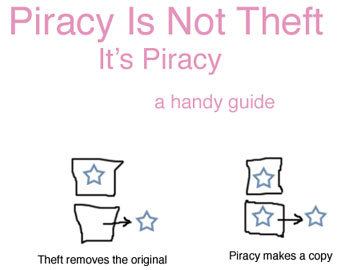- Joined
- May 8, 2009
- Messages
- 1,716
- Reaction score
- 790
- Gender
- Undisclosed
- Political Leaning
- Undisclosed
If the food is bad enough, I'll demand a refund yes.
But that's not what I asked. Let's try again:
When you go to a restaurant and order something that tastes good but isn't quite as yummy as you believed it would be, do you refuse to pay?
How many movies have you watched on over the air tv, that you never paid for?
It's not possible for me to watch "over the air" movies on TV without paying my satellite company, which in turn pays royalties on the films they broadcast.
What about songs on the radio
Bad analogy. I don't end up with any tangible copy of what is broadcast by just listening. But the radio station still pays royalties on the music they broadcast.
pictures by contemporary painters?
This also doesn't follow. If I want an actual oil painting to hang on my wall, I have to go buy one. You can't download such a thing.
The fact is that in almost every aspect of the IP world you're allowed to sample the product before you buy it.
AH! You finally found the crux of the matter. Sampling is being offered a snippet of something far larger, as an enticement. You've said that "if I like the movie I'll buy it, if not, they didn't earn my money." But there's no way to know if you "like the movie" before seeing the movie. ALL of the movie. A three-minute snippet of a film is simply not enough for any human to make a final judgment on whether or not they "like the movie."
Sampling is fine. It's marketing. It's PR. It's smart business.
But what you're advocating is being given the entire film to view, and then paying for that pleasure ONLY if you "liked" the whole thing. That's something entirely different. And you know it.
I'd like the option of a refund, as it is, that option is very restricted in most places.
Huh? You'd like the option of a refund because the movie was pretty good, but not the best movie you ever saw? Maybe I need to ask the question again:
When you go to the movies, and the film is ok, but not quite as exciting and entertaining as you believed it would be, do you demand a refund?
A lot of the time you can't get a refund on a DVD and must settle for store credit.
That's because YOU USED IT (and for all the store knows, you made a copy for yourself before returning it). :doh
I think you should question the moral reasoning behind the movie cartel and why they resist allowing you to own you property how you want it.
I do question the movie/music cartels. I think they're ultimately ripping off the artists just like you are. But beyond that...
You know, I've got a great collection of these big flat pieces of plastic called record albums, that replicate live music. They're really old, and some are sort of damaged, and they can only be listened to at home, so they aren't very practical. But then, along came these nifty things called 8-track tapes - portable music! Cool! So I went to the music store and bought 8-track tapes of a lot of my favorite albums. Then someone invented cassette tapes that worked even better than 8-tracks, and out I went to buy more new copies of those old record albums. Pretty soon, another new invention - compact discs! Awesome!
Now I've got four versions of exactly the same thing. Big deal. Life goes on. I certainly don't expect the people who created the recordings on vinyl to supply me with an 8-track and a cassette and a CD years down the line just because someone invented a new technology. They all deserve their part of the pie. Including the original artist.
Bottom line: I still live by my principles, even when others don't.
They want DRM devices installed in your computer, TV, DVD players, Cellphones etc.
I support the prevention of copyright infringement.
They want you to own their product how they want it and for you to be locked into sometimes buying their same product multiple times.
Well, this just sounds like whining to me.

